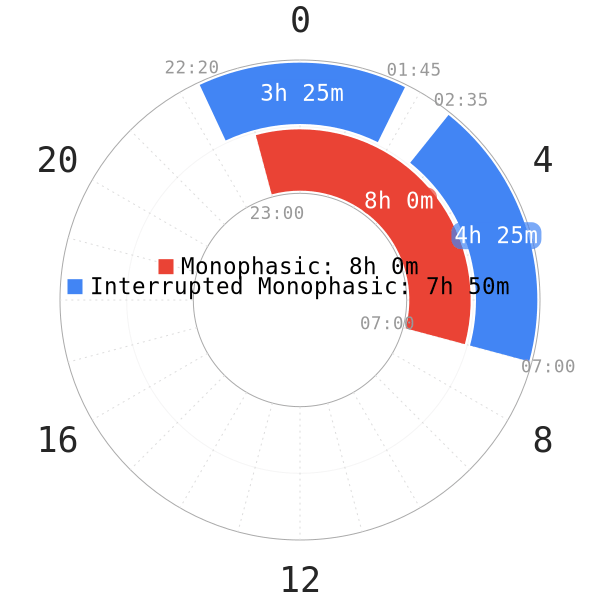Introduction
There are several individual factors to consider when you are trying to determine if a given sleep schedule is right for you.
Individual Sleep Requirement Check
First, check if you have special needs for higher sleep requirements.
- Do you require 9+ hours of sleep every day to feel refreshed? Even when you are not recovering from former sleep deprivation? Note that sleep deprivation recovery can take a couple of weeks of long sleep.
- Are you younger than 18? Risks are less known and more serious for reducing total sleep. If so, proceed to Age Considerations.
- Do you do or wish to do intense exercise or physical labor multiple days a week? You should plan for a minimum of 3 uninterrupted core cycles per day. For example, Everyman 2, E3-extended, DC1-extended, Triphasic-extended with two cycles (3h) in the night core.
Individual Lifestyle Check
Then, investigate your lifestyle. When can you reliably sleep and nap every day?
- To do a non-biphasic schedule, you must not have more than an 8-hour period where you cannot nap every day. This is because schedules with lower sleep totals, like E3, require even smaller wake gaps.
- It is much better to be busy past noon rather than before noon. This is because daytime sleeps require sufficient REM pressure, which is prevalent in the morning. It is also easier to stay awake longer in the afternoon hours until night hours on polyphasic schedules.
- Aim for nap or sleep times close to SWS peak (21:00-midnight), REM peak (06:00-09:00), and midday alertness dip (11:00-14:00). This can be avoided by shifting and maintaining the circadian rhythm.
- If planning gets difficult, be creative with your plans! Try sleeping in quiet rooms, a car, or at your desk with a sleeping mask and earphones. White/pink/brown noises may also help.
Monophasic/Segmented Behavior Check

Do you naturally wake up in the early morning hours and stay awake easily for one or more hours before falling back asleep?
- You might have felt that something is wrong with you, or that it is a problem. Sometimes it is a symptom of an underlying disease or deficiency and it may be worth seeing a doctor. If not, you may be a natural Segmented sleeper, which is a type of Biphasic sleep1.
- If you tired because of this, you are probably not going to bed early enough. In addition, you may be waking up late enough to stay awake long enough in the wake period.
- Segmented can also go well with naps as in the Dual Core line. Furthermore, the cores can further split up to become a Tri Core schedule.
- If you wake frequently but do not necessarily stay awake easily, you may still benefit from intentionally short cores of only one or two cycles each. Each sleep interruption in a long block decreases sleep quality; meanwhile, spreading short cores throughout the day can increase quality with circadian and homeostatic pressures.
Choosing Your Specific Schedule
Now you have a sense of when you can and should sleep, feel free to explore the various schedules the community has developed over the decades. Note that there are still individual differences in their efficacy.
- If you are a beginner, look at easier or moderate schedules like Everyman 1 (E1), Siesta, Segmented, E2, Dual Core 1, E3-extended or Triphasic-extended.
- Avoid rotating or modifying these schedules far from the the standard recommendations. Keep in mind that the scheduling boundaries provided later in this guide refer to strict placement of permanent sleep blocks. This is different from flexing the sleep times. For more information on how strict each sleep block should be, see the “Managing sleep deprivation” section.
You should also not use only your own insights when designing a schedule. It is very easy to miss some important details. Once you have studied this, you should ask an experienced polyphasic sleeper to examine and verify your schedule. Post on the /r/polyphasic Subreddit or in the Discord chat server. Moreover, complicated cases should work well with interaction on the Discord to see what uncommon modifications might be possible or necessary.
Main authors: Crimson & Aethermind
Page last updated: 5 January 2021
Reference
- Ekirch AR. At Day’s Close: Night in Times Past. WW Norton & Company; 2006.
